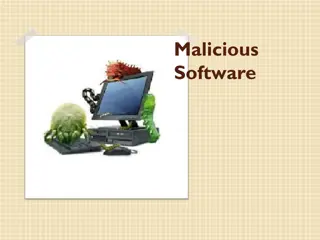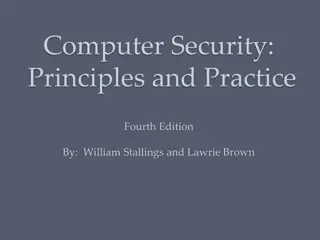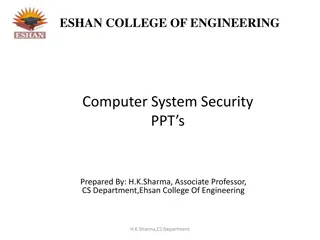Understanding Malware: Types, Usage, and Protection
Malware, short for malicious software, encompasses various forms of hostile software designed to disrupt computer operation, steal sensitive information, or gain unauthorized access. It includes viruses, trojan horses, worms, spyware, phishing, ransomware, and more. Malware is often used to steal pe
1 views • 49 slides
Understanding Malicious Software and Its Impact on Computer Systems
Malicious software, commonly known as malware, poses a serious threat to computer systems by exploiting vulnerabilities. This content covers various terminologies, categories, and types of malware, including viruses, worms, rootkits, spyware, and adware. It also delves into how malware can cause dam
0 views • 16 slides
Understanding Malicious Software in Computer Security
In "Computer Security: Principles and Practice," the chapter on Malicious Software covers various types of malware such as viruses, adware, worms, and rootkits. It defines malware, Trojan horses, and other related terms like backdoors, keyloggers, and spyware. The chapter also discusses advanced thr
0 views • 49 slides
Understanding Malware: Types, Risks, and Prevention
Malware, short for malicious software, is designed to disrupt, damage, or gain unauthorized access to computer systems. Malware includes viruses, worms, trojans, ransomware, adware, spyware, rootkits, keyloggers, and more. They can be spread through various means like malicious links, untrusted down
0 views • 15 slides
Understanding Computer System Security Threats and Malware Types at Eshan College of Engineering
Explore the world of computer system security threats and malware at Eshan College of Engineering through insightful presentations prepared by Associate Professor H.K. Sharma from the CS Department. Learn about security threats like intrusion, phishing, spyware, spam, and malware categories such as
0 views • 13 slides
Understanding Malicious Software: Classification and Payload Actions
Malicious software, or malware, can be broadly classified based on how it spreads and the actions it performs once on a target system. This classification includes distinctions between viruses, worms, trojans, botnets, and blended attacks. The payload actions of malware can range from file corruptio
0 views • 44 slides





